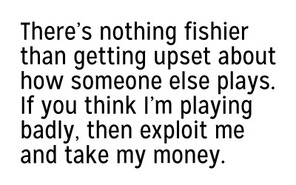






Poker Strategy With Andrew Brokos: Grow UpShut Up And Play The Game |
|
|

Andrew Brokos
As a result, the field was quite weak. Though the event allowed reentries for the first hours, I expected that many of the locals were going to fire just one bullet, and as a result my game plan was to try to run them over in the early levels.
My starting table looked great. Of the first few players to take their seats, only one had the potential to be a professional. I never got his name, but for the purpose of this article, I’m going to call him Timothy.
Blinds started at 25-50, and I drew the big blind (BB) for the first hand. Three players limped, the small blind completed, and I threw out 300 more with K-7 offsuit. All three limpers called. “Trying to run us over already?” Timothy asked as he made his call. I gave him a half-smile but otherwise didn’t respond, which is standard table demeanor for me.
The flop came 5-3-3 rainbow. I bet about half the pot, the first limper called, the rest folded. Timothy shot me an evil look as he folded.
The turn was a nine. I bet three-quarters of the pot, and my opponent called again. I gave up on a river six, and when he checked behind, I turned my cards over. He collected the pot with a pair of deuces.
“King-seven,” Timothy said. “First level of the tournament and this guy is already playing aggressively.”
Any residual presumption of respect I may have had for him as a player went out the window with that comment. There’s nothing fishier than getting upset about how someone else plays. If you think I’m playing badly, then exploit me and take my money. If I’m giving you tough decisions, then by definition I’m doing something right. Either way, shut up and play the game.
Timothy looked to be in his early twenties, though it later came out that he’d actually just turned thirty. It’s not uncommon for young people — men especially, I think — to display this sort of emotional immaturity. I’ve certainly been guilty of it myself, and a big part of my improvement as a poker player revolved around learning to curb it. It seems to me to be a childish sense of entitlement that other people should behave the way you want them to combined with a lack of any filter between your internal feelings and your external behavior. Poker is a game that punishes both of these flaws.
 I never did anything that spazzy again, though my willingness to raise with less than A-Q made me far and away the most aggressive player at the table. This fact was not lost on Timothy, who let me know what he thought of me loudly and often.
I never did anything that spazzy again, though my willingness to raise with less than A-Q made me far and away the most aggressive player at the table. This fact was not lost on Timothy, who let me know what he thought of me loudly and often.
We soon got into a pot where I raised preflop with aces and got a couple of callers, including Timothy. The flop came A 10
10 5
5 , I made a smallish bet, and only he called. I checked the 7
, I made a smallish bet, and only he called. I checked the 7 to him on the turn, he bet 750, and I quickly threw 3,000 into the pot. After some angry looks, he showed me a ten and folded, saying, “I know this is the best hand.”
to him on the turn, he bet 750, and I quickly threw 3,000 into the pot. After some angry looks, he showed me a ten and folded, saying, “I know this is the best hand.”
“That’s a funny way to play the best hand,” I told him as I passed my cards face down to the dealer. It’s not like me to needle, but it seemed like clearly the most plus expected value (EV) move where Timothy was concerned.
The very next hand, he got involved in a big pot with the sweet, grandmotherly woman on my right. He flopped top set versus her straight and paid off her river bet despite sensing that he was beat. “I know you have it,” he said as he threw his chips into the pot. She showed the nuts. “You flopped it,” he groaned as he mucked his hand. “Of course you f#$%ing did.”
“Call the floor,” the woman told the dealer. “I’m not going to put up with this.”
To his credit, Timothy quickly and sincerely apologized. “I wasn’t cursing you, I was cursing my bad luck. Cursing myself, really. I knew I was beat. Nice hand.”
She accepted the apology graciously and told him it was big of him. He seemed to appreciate that and calmed down a bit, which wasn’t necessarily good for me, but it didn’t take much to rile him up again.
I raised with a suited A-2 and got a couple of calls, then checked a backdoor-flush draw on a 6-4-2 flop. The turn was another deuce. Timothy bet, and I called. The river was a blank, he checked, and I threw out 3,000, about twice the pot. He beat me into the pot and turned over A-Q like it was the nuts. Needless to say, his head exploded when I showed my hand and collected the pot.
“Why is he playing this way? It’s level one!” he moaned to no one in particular.
This time I didn’t need to rib him, because a younger woman just taking the seat to my left did it for me. “You should kick his ass!” she advised with a smirk. It was the perfect way to highlight how ridiculous and immature Timothy was being, and he was duly chastened.
He didn’t exactly become a paragon of self restraint, but some combination of the reprimands from these women and the undeniable evidence that his temper was causing him to play badly seemed to give Timothy some perspective. His luck eventually changed, but even before it did, his outbursts became less frequent and his play less tilty.
I’m not claiming that poker is some magic bullet. I’m sure we all know guys (and it is usually guys) who have been playing for decades and cry like babies over every perceived injustice.
Still, I believe that, for those who are committed to improving their results at the table, poker can be the impetus for emotional growth. This is because poker is absolutely unforgiving in this regard. If you refuse to take responsibility for the contribution that your own choices and make to your results and focus only on external factors such as the turn of a card or the actions of other players in the game, then you will never improve.
Call me an optimist, but I believe that Timothy realized some of this. He was chastened by the older woman’s indignance and the younger woman’s teasing and knew that he was out of line. When I tabled my trips, he couldn’t deny that his temper had been his undoing. He’d made plain that he was frustrated with me and ready to pay me off, and I’d blatantly taken advantage of it by feigning recklessness with a monster hand. There was no denying that he’d paid a price for his immaturity. ♠
